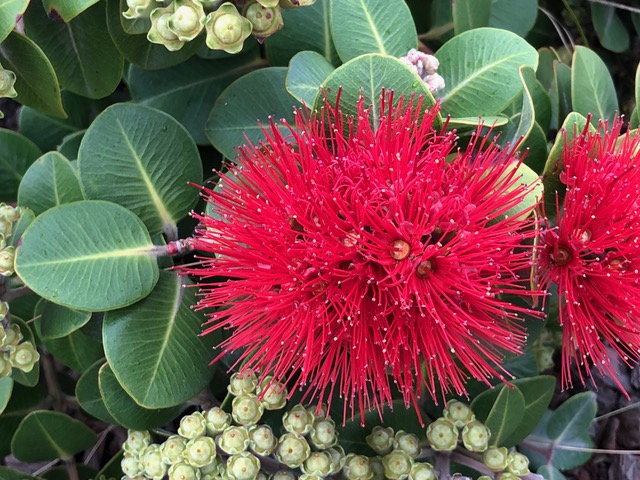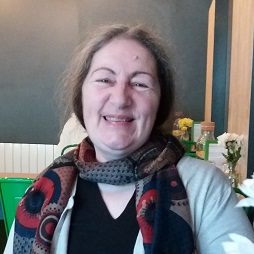 Bev Rennie
Bev Rennie
IMELDA MAGUIRE
The Botanist
She was that kind of child — the one
who picked up stray ideas or string
or pebbles or empty snail-shells, the one
who wandered the fields with a sister,
all summer long, it seems to her now.
She remembers one day — a Sunday,
alone, restless, and bored with her book,
she took herself up the road to a wild field,
the one with deep hedgerows and blackberries
not ready for eating but worth remembering
until later, come August, come September.
Far up, inside the hedge, an apricot colour,
unusual in a briar, drew her, then she saw it —
the golden trumpets radiating from the centre,
the whiskery stamens. And then the scent!
it carried with it all the sweetness of honey!
She almost snapped the stem but withdrew,
leaving it to bloom in its safe place. Noting
the spot so as to share the beauty with others
It didn’t matter that Dad later said the flower
was only honeysuckle, known to everyone.
On that day she was a discoverer of plants
rare and strange. She was Fuchs. She was Dahl.
And the world would one day know her name.
Tree Song
It was the voice of the wind
in the trees — the beeches, pines,
that old sycamore beyond the wall,
that lulled me to sleep,
murmuring an autumn lullaby,
all shh, shh, shh...
They said it was time,
time for slowing, for settling in;
told me I had gathered enough.
It was time now to rest, allow
silence to come, for now.
They said to wait a little while,
in this nesting place,
to settle and trust that after autumn,
after winter, after rest,
spring will come again;
to know that what’s been gathered,
what’s been stored, will last,
that every seed will come to its birthing time,
that every root will one day cast a new shoot.
Summons
When they would call me, the trees,
the voice was always kind. They would
whisper of gifts they had to share —
conkers and wings, dry-as-paper fishbones,
hiding-places, low branches; all offered
in the back-then times. It never seemed
that there might come a time
when we’d be strangers, lost to one another,
or reduced to nodding acquaintance.
Now I’m reminded (again, they murmur to me,
all the time asking Will you come?) there is still time
to sit in the bole of a chestnut, be held by roots,
deep and strong, time to lie beneath, time
to rest my cheek on the bark of a birch.
What do they ask of me in their call? They ask me
to bring the children, set them loose among their trunks,
in search of a sticky bud, a certain leaf, a single seed,
a low-hanging branch on which to dream.
Their plea is Be with us, praise us, tell of our beauty,
and oh, tell of our pain; tell of the wounds
you have seen — the ones we might recover from,
the ones that may become scars of battle,
the ones that might end our days.
They tell me that I am of them.
They call me sister now, not child, and now
it seems the gifts they offered in childhood
have all turned to tears, falling,
falling — golden tears.

Imelda Maguire
Bio: Irish poet Imelda Maguire lives in Donegal, the far north-west corner of the country. Her poetry has been published widely in journals and anthologies in Ireland. She has read at Poetry Ireland’s Introductions series, and at various literary festivals and events throughout the country. A retired counsellor, she facilitates creative and personal development activities with individuals and groups. Her first collection, Shout If You Want Me To Sing, was published in 2004 by Summer Palace Press. Her second collection, Serendipity, was published in 2015 by Revival Press.

